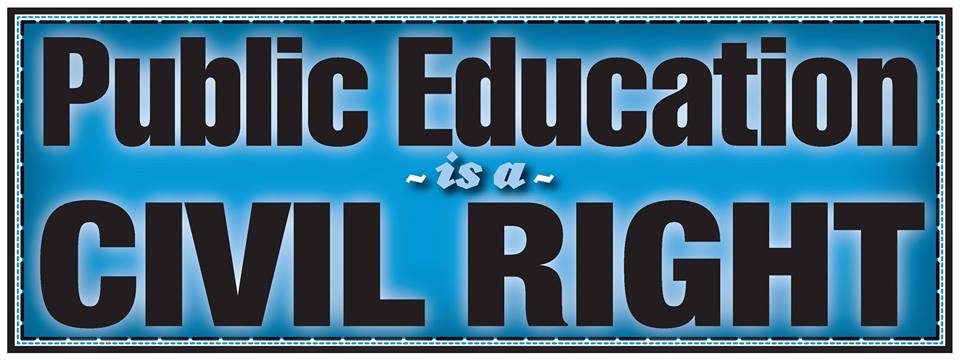Public Education
 We support lifelong public education that is entirely funded through public funds to enable people to lead meaningful and productive lives.
We support lifelong public education that is entirely funded through public funds to enable people to lead meaningful and productive lives.
We know that the public education experience is the primary social institution factor that young people encounter outside of the family, and that it exerts a tremendous influence on them.
We believe that public education:
• is the most important insurance we have that California’s basic principles of social justice will be preserved.
• is a basic right of all inhabitants of California, citizens and non-citizens
• must occur in a safe environment for all
• must foster creativity
• must provide people the abilities to understand and use sources of information to be able to critique what is seen and heard in the media
• must confer the tools to participate and be initiators in the democratic process, discourse, governance, and social justice
• must be adequately funded and based on need (such as for schools who have students who are English language deficient and/or are in high poverty areas). The underfunding caused by the implementation of Proposition 13 must be addressed as must the underfunding of community colleges (they educate more students than the University of California and the State University systems combined, and have historically served immigrants, women, people of color, the working class, continuing education students, and others who cannot afford the other systems). Optimization of the procurement and spending of federal and state funds needs to occur also.
• must not rely on standardized tests to reflect educational achievement because of their biases that reduce education quality to the lowest common denominator. Instead we support the use of tools such as the “learning record” that rely on the authentic assessment of a student's actual work in terms of that student’s gifts and abilities.
Our public education system must facilitate people’s abilities to:
 • communicate (read, write, listen, operate electronic media including spreadsheets, and speak)
• communicate (read, write, listen, operate electronic media including spreadsheets, and speak)
• understand how the physical world works (pure and applied sciences that must include mathematics, ecology, and environmental health)
• allocate resources (economics, accounting, civics, politics, geology, and geography)
• teach basic life skills including economics, bookkeeping, budgeting, and the everyday use of mathematics that are essential to participation in any society and democracy
• study the wisdom and shortcomings of people who came before us (history and anthropology)
• understand health (nutrition, medicine, physical education, physical and mental activity, and public health)
• understand human nature (psychology, sociology, social and governance systems, legal and political systems, ethnicity/gender/sexual orientation/gender identity/race studies, and cultures)
• appreciate and enjoy creative arts (music, dance, drama, fine arts), and creative vocations
• design a balanced fulfilling life
• nurture and empower all, with parents wanting to send their children into the system, the teachers wanting to work in it, and the children and adult students wanting to learn within it
• fight the prejudices, biases, and stereotypes of our society
• advocate for diversity, cooperation, and ending student segregation based on any classification or perceived classification but addressing special needs
• encourage the sense of belonging to a greater society
In addition, the Green Party advocates the following specific proposals:
 • Oppose state or federal requirements to make significant decisions about schools, teachers or students based primarily on standardized test scores.
• Oppose state or federal requirements to make significant decisions about schools, teachers or students based primarily on standardized test scores.
• Increase compensation for teachers. Improve teacher support, training, mentoring and sabbaticals. Work to recruit and retain qualified teachers, especially those of color.
• Substantially increase and make more equitable state and federal funding for public education at all levels, from preschool and K-12 to the community college, the California State University, and the University of California systems.
• Affirm the value of public education and reject the allocation of public funds for private or parochial schools, or any for-profit organization to manage or run a public school.
• Decrease the student-teacher ratio in classrooms and increase the number of counselors, nurses, librarians and social workers
• Advocate the design and use of a variety of developmentally appropriate assessment techniques that allow necessary accommodations, modifications, and exemptions and are bias-free, reliable and valid.
• Advocate for the rights of parents to opt their children out of all mandated standardized tests without penalty for students, parents, teachers or schools.
• Oppose any advertising or promotion of commercial products on a school site or in any adopted or recommended curricular materials or school-based Internet access.
• Develop curricula that reflect the connections between our rights as individuals, and our responsibilities to others and to a healthy planet
• Add before-school and after-school programs and provide nutritious, plant-based organic breakfasts and lunches for all students, subsidized according to financial need.
• Make all public education sites gun-free to provide a safe learning environment
• Include self-defense skills in the physical education curriculum at elementary school level
• Provide a curriculum on non-violent interaction at the junior high school level. • Advocate for the inclusion of curricula on ethnic studies at the high and elementary school levels, and also as a graduation requirement for high schools
• Advocate for the inclusion of curricula on ethnic studies at the high and elementary school levels, and also as a graduation requirement for high schools
• Provide training in negotiation, mediation, non-violence skills at the senior high schools level
• Provide researched-based drug, tobacco, and alcohol prevention
• Include curricula focusing on civil rights history, actions, and advances, and how current law can be used to achieve personal civil rights
• Provide age-appropriate education on sex, gender, race, ethnicity, sexual orientation, gender identity, age, and safer sex.
Amended by the GPCA Standing General Assembly , November 29, 2015




